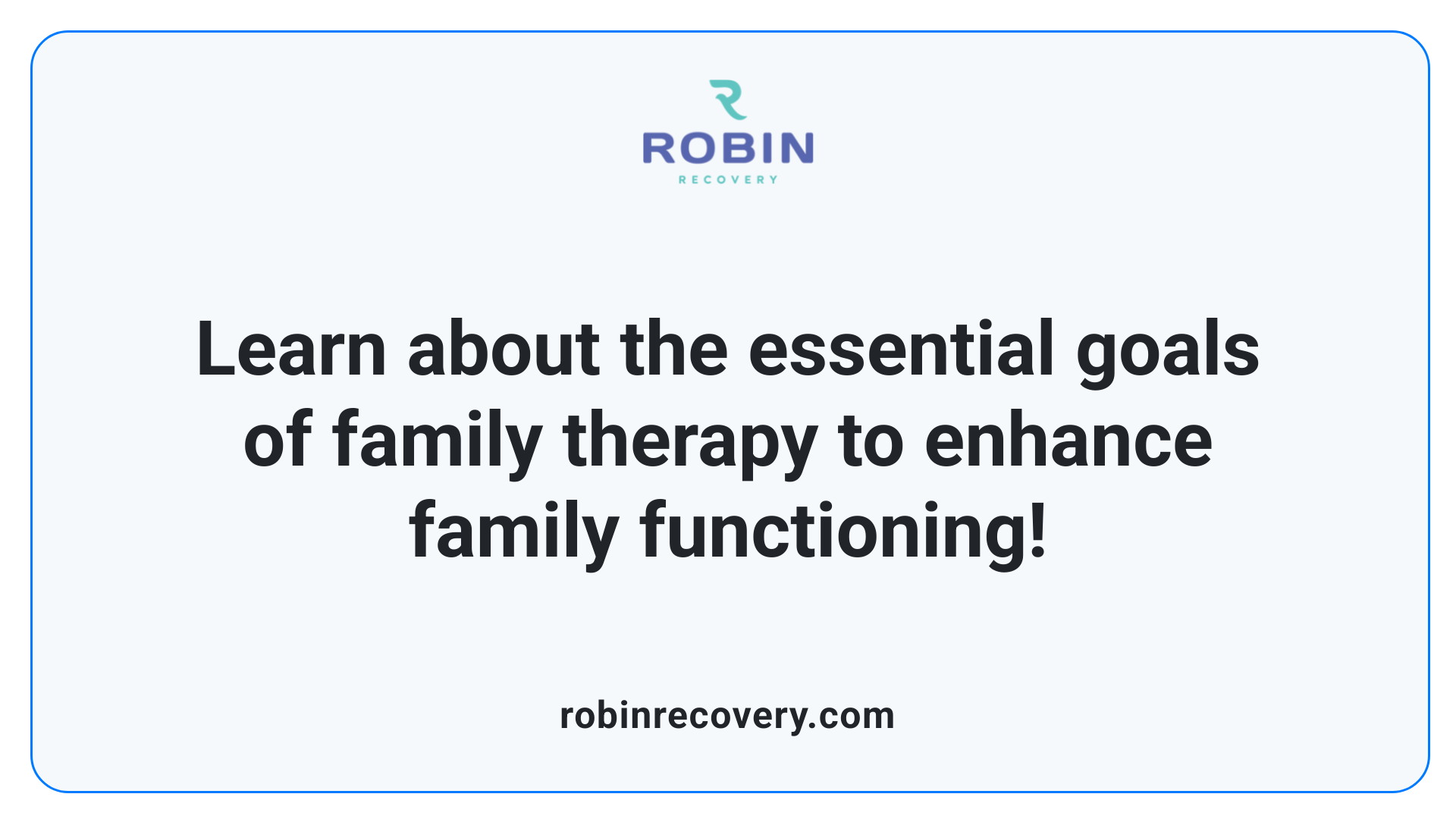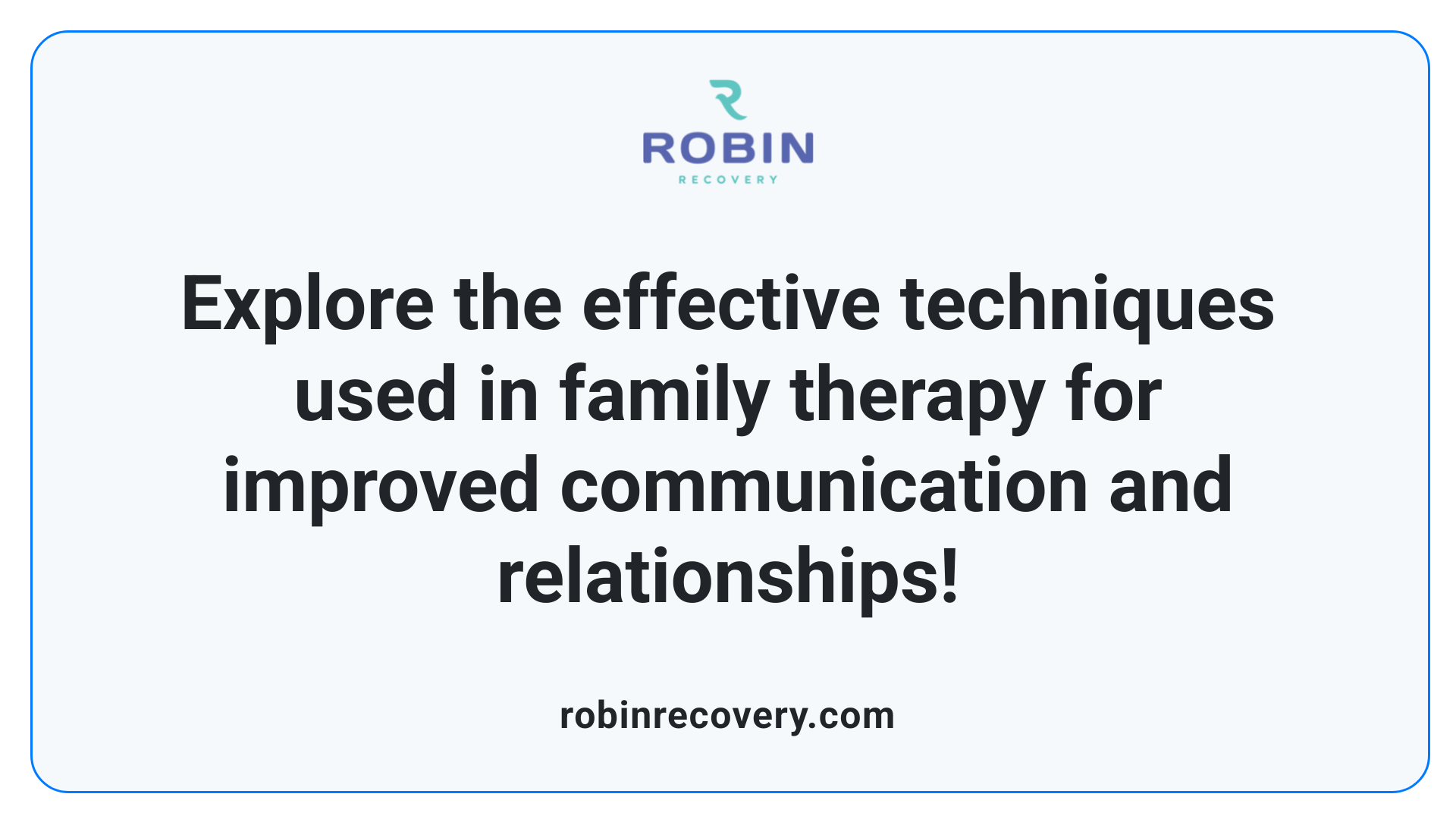How Family Therapy Helps Improve Overall Family Well-Being

Introduction to Family Therapy
Family therapy offers a powerful avenue for improving overall family well-being by focusing on relationships and interactions among family members. As a form of psychological counseling, it aims to enhance communication, resolve conflicts, and improve familial support systems. Families undergoing therapy learn valuable skills that contribute not only to individual mental health but also to the collective well-being of the group. This article explores the benefits, techniques, and goals of family therapy and how it addresses various familial issues.
Benefits of Family Therapy

What are the benefits of family therapy?
Family therapy provides numerous advantages that can profoundly improve family dynamics. One major benefit is effective conflict resolution. By fostering open communication in a safe, nonjudgmental environment, family members can express their feelings and concerns. This naturally promotes understanding and empathy, allowing families to navigate conflicts successfully.
Mental health improvement
Another significant benefit is the enhancement of mental health. Research shows that family therapy can effectively address issues such as anxiety, depression, and stress. Nearly 90% of participants report an improvement in their emotional health after engaging in therapy. This holistic approach not only aids in healing individual wounds but also strengthens the family unit as a whole.
Relationship strengthening
Family therapy excels in strengthening relationships. Through collaborative efforts in therapy, family members learn to appreciate each other’s perspectives. Engagement in sessions encourages teamwork and cooperation, allowing families to work together towards common goals and rebuild trust, which is crucial for healthy relationships.
Empathy and understanding
Lastly, family therapy promotes empathy and understanding. By engaging in guided discussions and role-playing, members can better comprehend one another’s experiences and emotions. This enhanced empathy reduces misunderstandings and conflicts while fostering a supportive atmosphere conducive to emotional well-being. Ultimately, family therapy equips families with essential skills for healthier interactions and deeper connections.
Primary Goals of Family Therapy

What is the primary goal of family therapy?
The primary goal of family therapy is to tackle the psychological, behavioral, and emotional difficulties that can hinder family functioning. By working collaboratively with a therapist, families can learn to enhance their communication, clarify roles, and set healthy boundaries.
Family therapy emphasizes involvement from all members, fostering a collective approach to healing and problem-solving. This can be particularly beneficial for addressing challenges related to mental illness and the stigma that often accompanies it. Different therapeutic modalities, such as family psychoeducation and targeted interventions, serve various needs depending on the specific family issues at play, including conduct disorders, substance abuse, and depression.
How does family therapy improve communication?
Improving communication is a primary focus. Families often struggle with misunderstandings and unexpressed emotions, which can lead to conflict. Family therapy provides tools and strategies for members to share their feelings and thoughts more openly, thus reducing conflicts and building trust.
What role definition means in family therapy?
Role definition within family therapy is crucial for creating clarity about each member's position and responsibilities. By recognizing and restructuring these roles, families can work more effectively together, reducing confusion and frustration.
Why is boundary setting important?
Boundary setting is another vital goal. Establishing healthy boundaries helps prevent intrusions into personal space, leading to greater respect among family members. This allows each person to feel secure, both emotionally and physically, which is essential for nurturing relationships.
In summary, family therapy focuses on improving communication, defining roles, and setting boundaries, with the overarching goal of enhancing family dynamics and supporting each member's mental health.
Common Techniques in Family Therapy

What are some common family therapy techniques?
Family therapy utilizes a variety of techniques designed to enhance communication and address relational conflicts among family members. Key methods in practice often include:
- Active Listening: Family members take turns paraphrasing what the other has said. This practice promotes understanding and ensures that everyone feels heard.
- Positive Reinforcement: Desired behaviors are acknowledged and rewarded, encouraging family members to engage in more constructive interactions.
- Narrative Therapy: Families share their stories and experiences, helping to validate feelings and reframe negative narratives that may affect relationships.
- Role-Playing: This method allows family members to practice new communication strategies by stepping into each other's shoes, fostering empathy and understanding.
Other important techniques include psychoeducation, which provides families with valuable information about mental health issues, improving their dynamics. Soft Start-ups, which encourage initiating discussions with 'I' statements, help minimize defensiveness and hostility. Additionally, therapeutic approaches like Structural Family Therapy implement tools such as circular questioning and family mapping to explore family dynamics deeply. These techniques work together to foster healthier interactions and lasting change within the family unit.
Technique Description Benefits Active Listening Paraphrasing and reflecting on what others say Increases understanding and empathy Positive Reinforcement Acknowledging and rewarding desired behaviors Encourages constructive interactions Narrative Therapy Sharing and validating family narratives Reframes negative perceptions Role-Playing Practicing new communication strategies through role reversal Builds empathy and improves dialogue
Enhancing Family Well-Being Through Therapy

Understanding family dynamics
Family therapy takes a holistic approach to understanding family dynamics, emphasizing how relationships among members impact mental well-being. Therapists guide discussions to uncover harmful patterns, enabling families to identify issues affecting their emotional state and fostering empathy.
Resolving misunderstandings
By creating a safe environment for open dialogue, family therapy encourages members to share their thoughts and feelings freely. This practice significantly reduces misunderstandings, as families learn effective communication strategies like active listening. Addressing conflicts constructively strengthens familial bonds, leading to a deeper understanding of each other's perspectives.
Improving emotional health
Engagement in family therapy has demonstrated notable improvements in mental health, with studies revealing that nearly 90% of participants report better emotional well-being. Families learn to support each other through stressful situations, which enhances individual coping mechanisms and overall family functionality.
Creating supportive environments
The ultimate aim of family therapy is to foster a nurturing environment. By enhancing communication, establishing healthy boundaries, and strengthening emotional connections, families become empowered to navigate challenges collectively. As a result, the home transforms into a supportive haven, contributing to the mental health of all members.
Aspect Benefits of Family Therapy Outcomes Communication Improved expression of thoughts and feelings Reduced conflicts and misunderstandings Emotional Health Enhanced shared emotional experiences Increased individual mental health and coping skills Relationship Strength Stronger emotional bonds and trust A supportive and harmonious family environment
Addressing Intergenerational Trauma

How does family therapy aid in addressing intergenerational trauma?
Family therapy plays a vital role in addressing intergenerational trauma by focusing on the family unit as a whole. This inclusive approach allows family members to explore and heal the relational patterns that contribute to trauma, enhancing communication and emotional regulation. One of the significant benefits of family therapy is its ability to foster resilience and supportive relationships that can help break cycles of dysfunction.
Healing Past Wounds
Therapeutic techniques such as narrative therapy encourage families to reframe their experiences, fostering a sense of understanding and healing. This supportive environment allows individuals to share deeply rooted family histories, providing younger generations with insights into their familial context.
Breaking Dysfunction Cycles
Through active participation, family therapy helps identify harmful patterns and behaviours. Families can collaboratively address these issues, working towards healthier interactions that prevent the repeating of negatives patterns ingrained in their histories.
Improving Familial Relationships
By promoting understanding and empathy, family therapy enhances family dynamics. The focus on open communication helps build trust among members, strengthening their emotional bonds.
Therapeutic Techniques
Techniques employed in therapy can include attachment-based family therapy, which aims to improve emotional connections. These interventions are tailored to meet each family's unique needs, ensuring a comprehensive approach to healing.
In conclusion, family therapy empowers families to collaboratively process trauma, develop effective coping strategies, and ultimately embark on a meaningful healing journey together.
Exploring Different Types of Family Therapy
What insights do different types of family therapy offer?
Different types of family therapy provide essential insights into improving family dynamics and addressing dysfunction. Each therapy model offers unique techniques designed to tackle specific challenges within family systems.
Structural Family Therapy
This approach, developed by Salvador Minuchin, emphasizes the structure and interactions within the family. Structural Family Therapy (SFT) aims to reorganize familial interactions to improve communication. Therapists often use techniques such as family mapping, role-playing, and boundary-making to identify and rectify issues such as power imbalances and ineffective communication patterns. SFT is particularly effective in addressing trauma, mental health issues, and significant life changes, fostering improved cohesion and parental competence within families.
Strategic Family Therapy
Strategic Family Therapy focuses on resolving specific problems affecting the family. This approach involves direct interventions and encourages families to adopt new strategies for coping with challenges. The therapist designs tailored strategies to prompt immediate changes and solutions, often utilizing techniques such as homework assignments and strategic questions to provoke thought and action.
Psychoeducation
Psychoeducation aims to increase family members’ understanding of mental health issues and their impacts on family dynamics. This approach provides education about specific disorders and teaches coping strategies, enhancing overall family support for affected individuals. Engaging in psychoeducational sessions can help families develop healthier responses to various stressors and improve communication skills.
Type of Therapy Focus Area Key Techniques Structural Family Therapy (SFT) Family interactions and structure Family mapping, role-playing, boundary-setting Strategic Family Therapy Addressing specific problems Direct intervention, homework assignments Psychoeducation Educating on mental health issues Information sharing, coping strategy training
In summary, these different therapeutic approaches highlight the importance of viewing the family as a system, where the behaviors and experiences of one member significantly affect the entire unit.
Conclusion: The Transformative Potential of Family Therapy
Family therapy holds tremendous potential for transforming family dynamics and fostering well-being. By addressing relational patterns and enhancing communication, families can overcome challenges such as mental health issues, intergenerational trauma, and life transitions. This therapeutic process not only improves individual mental health but also strengthens family bonds, enabling members to work collaboratively towards a harmonious and supportive home environment. Embracing family therapy as a tool for change opens avenues for healthier relationships and enriching family experiences, ultimately leading to more fulfilling and resilient family systems.
References
- Family Therapy: What It Is, Techniques & Types - Cleveland Clinic
- Benefits of Family Counseling and How It Works - MedicalNewsToday
- The Impact of Family Therapy on Mental Health and Well-being
- The Benefits of Family Therapy: Strengthening Bonds and Improving ...
- Healthy Family Dynamics- The Role of Therapy
- Family Therapy and Systemic Approaches to Mental Health
- How Family Therapy Can Help | Banner Health
- Strengthening Bonds, Nurturing Well-being: The Power of Family ...
